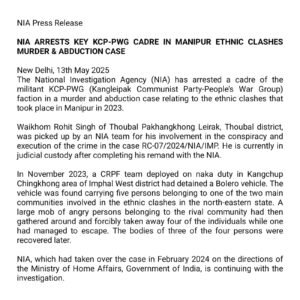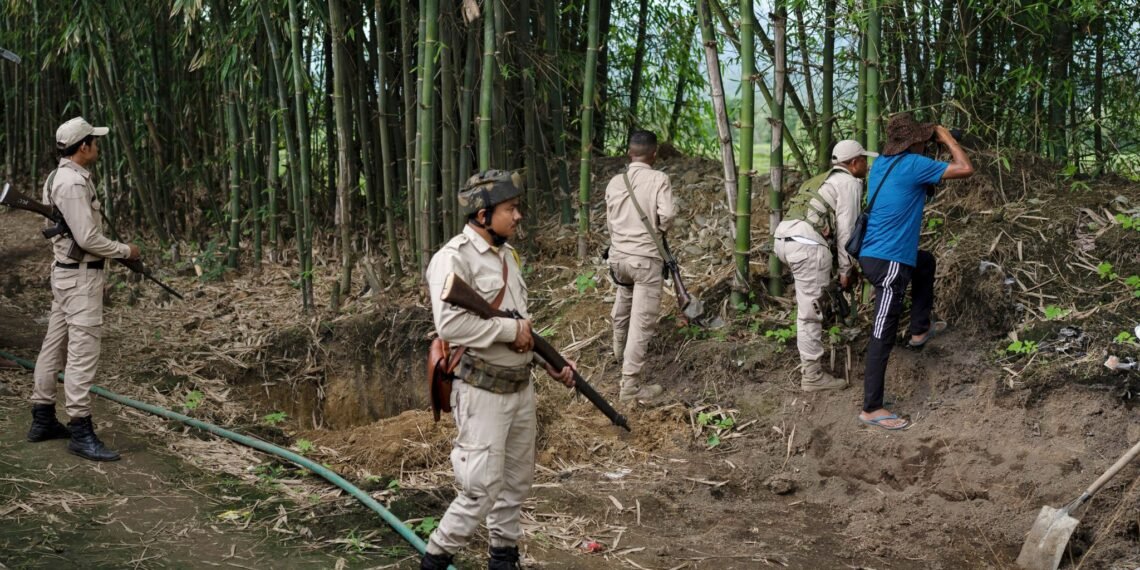Over a year after the Manipur ethnic conflict erupted, investigators have begun making arrests tied to earlier killings, but critics warn that without targeting key leaders like Arambai Tenggol chief Korounganba Khuman, justice will remain elusive.
BY Navin Upadhyay
May 14, 2025 – The National Investigation Agency’s (NIA) recent arrest of three persons linked to banned militant outfits marks a significant, albeit incomplete, effort to address the crime committed in Manipur in the ongoing ethnic strife.
The recent arrests, linked to the November 2024 attack on Zairwan Village in Jiribam and the November 2023 abduction and murder of three individuals in Imphal West, reflect the central and state governments’ willingness to pursue justice in cases of grave violence. However, with more than a dozen NIA investigations underway into the broader Manipur conflict—and key figures like Arambai Tenggol chief Korounganba Khuman still under scrutiny—these developments risk being seen as token gestures. Unless the agency moves decisively against the masterminds of the May 3, 2023 atrocities—including rape, murder, looting of weapons, and arson that triggered the Meitei-Kuki unrest—its efforts may appear incomplete.
The Arrests: A Glimmer of Accountability
The NIA apprehended Nongthombam Meiraba from Bishnupur, Sagolsem Sanatomba (aka Suruchandra Singh) from Thoubal, and a third suspect for their alleged roles in two violent incidents. The November 2024 Zairwan Village attack involved the rape and murder of a woman, while the November 2023 Imphal West case saw a mob abduct four individuals from a Bolero vehicle, killing three. These arrests target members of banned outfits like the United National Liberation Front (UNLF), Kanglei Yawol Kanna Lup (KYKL), and Kangleipak Communist Party (KCP), underscoring the NIA’s focus on militant elements fueling the conflict.
NIA Arrests 2 Accused in 2024 Manipur Village Murder, Arson and Looting Case pic.twitter.com/QuhWU2j6Wa
— NIA India (@NIA_India) May 13, 2025
ALSO READ: Special Story: When Shells Fell, Bunkers Were Missing in Kashmir
This move is significant for several reasons. It demonstrates coordination between the NIA, the central government, and the state to send a powerful message that those responsible for ethnic cleansing, regardless of community, will face justice. The arrests could deter further violence in a state where clashes have killed over 260, displaced 50,000, and drawn global scrutiny. By targeting specific incidents, the NIA lays the groundwork for broader accountability, offering hope to a nation desperate for justice in Manipur.

NIA’s Manipur Caseload: Scale and Status
As of May 14, 2025, the NIA was probing 16 cases related to the Manipur violence. These cases, originally filed by Manipur Police, were transferred to the NIA due to their gravity and national security implications. Several cases, including two implicating Arambai Tenggol chief Korounganba Khuman, were shifted from Imphal to Guwahati’s NIA Special Court in November 2024, citing security risks and mob interference in Imphal.
ALSO READ: KOHUR Appeals to NHRC Over Inaction on Ethnic Atrocities in Manipur
Key cases under investigation include:
November 1, 2023, Attacks (Arambai Tenggol): Khuman allegedly led armed Arambai Tenggol members in attacks on Imphal East police and the 1st Manipur Rifles Battalion, looting arms and ammunition. Mutum Rajesh Singh was arrested, but Khuman remains under investigation.
November 11, 2024, Jiribam Violence: This case involves the abduction and murder of six women and children, the burning of houses, and an attack on a CRPF post and Borobekra police station. The NIA began probing on November 21, 2024.
November 7, 2024, Zairwan Village Rape and Murder: A woman was raped and burnt alive by armed extremists. The NIA re-registered this case on November 13, 2024.
June 21, 2023, Bishnupur IED Blast: Three individuals, including Seiminlun Gangte, were arrested for an IED attack that injured three and damaged property.
Moreh IRB Post Attack: This case involves an attack on an Indian Reserve Battalion post, resulting in one death and injuries. No arrests have been reported.
September 2023 Arms Training Case: The NIA filed a charge sheet against five individuals, including Anand Singh, for organizing weapons training with the banned People’s Liberation Army (PLA) to escalate ethnic strife.
The NIA’s investigations aim to uncover larger conspiracies behind the violence. While arrests have been made in some cases, progress is slow, with many probes ongoing and major accused like Khuman yet to be detained. The Supreme Court has criticized the “tardy” pace of investigations, noting an “absolute breakdown of constitutional machinery” in Manipur.
ALSO READ: India Blocks China’s Global Times on X Amid Arunachal Row
The May 3, 2023 Flashpoint: Unaddressed Masterminds
Public trust in the NIA’s sporadic arrests hinges on addressing the May 3, 2023 violence. Sparked by a Tribal Solidarity March protesting Meitei demands for Scheduled Tribe status, the day saw horrific acts: the naked parading of a Kuki-Zo woman, widespread rape, murders, looting of over 6,000 weapons from armories, and arson. Specific atrocities included the murder of Tonsing Hangzing in an ambulance, the beheading of David Thiek, and the maiming of BJP MLA Vungzagin Valte.
The May 3, 2023 violence set the stage for Manipur’s descent into civil war, with mobs, allegedly led by Arambai Tenggol and Meitei Leepun, targeting Kuki-Zo communities. The NIA’s failure to prosecute those responsible—despite evidence of organized violence—undermines its recent arrests. Kuki Organisation for Human Rights Trust’s ( KOHUR) demands to the NHRC, including a full-scale investigation, prosecution of perpetrators, revocation of biased AFSPA enforcement, and action against Singh, highlight systemic issues.
The nation watches closely: will the NIA dismantle the networks that looted weapons, incited hatred, and enabled mass violence, or settle for low-level operatives? The agency’s credibility hinges on targeting figures like Arambai Tengool and addressing state complicity allegations. The Supreme Court’s transfer of cases to Guwahati reflects the challenges of investigating in a polarized state, but delays in justice risk deepening mistrust.
A Path to Reconciliation
The NIA’s arrests are a beacon of hope, proving justice is possible in Manipur’s chaos. However, hope alone cannot heal a state fractured by ethnic hatred. The agency must prioritize the May 3, 2023 architects to restore faith in the rule of law. Simultaneous disarmament of Meitei and Kuki militant groups, as demanded by civil society, and neutral security deployments are critical.
Without decisive action, Manipur risks remaining a tinderbox. The NIA’s 16 cases offer a chance to break the cycle of impunity, but only if they target the “bigger fish” and address systemic biases. Only then can these arrests mark the beginning of reconciliation, ensuring Manipur’s people—Kuki, Meitei, and others—see justice as a lasting commitment, not a fleeting gesture.














